On Taiwanese Left-Wing Revolutionary Su Beng (Si Tiâu-hui, 1918 -)
by Na Su-Phok
語言:
English /// 中文
Photo Credit: 林韋言/Next Magazine
Translator: Brian Hioe
SU BENG (Si Tiâu-hui, 1918 -) is to this day one of the few people in Taiwan to have experienced over two centuries of historic changes and multiple colonial regimes as a left-wing revolutionary. Su Beng was born in Shilin and studied in Waseda University in Tokyo. Because of his belief in Marxism, at one point, he went to Shanghai to serve as an underground intelligence agent for the Chinese Communist Party. But after witnessing land reform in northern China after the Chinese Civil War, and seeing the suffering of the people under the Chinese Communist Party (CCP), he escaped back to Taiwan by the skin of his teeth.
After witnessing the brutal outcome of the 228 Massacre, he and his comrades plotted to assassinate Chiang Kai-Shek, but their plan was exposed by the authorities and they were forced to flee to Japan, where he spent forty years in exile. Through these numerous twists and turns, he opened a noodle shop, New Gourmet, to support himself. He would go on to publish the first volume of his history of Taiwan written from a Taiwanese standpoint, Taiwan’s Four Hundred Year History. Whether engaged in armed struggle or writing history, Su Beng has dedicated the majority of his life to Taiwan. He has remained indefatigable after returning to Taiwan in 1993, rushing everywhere proclaiming Taiwanese nationalism and calling for the construction of a Taiwanese national consciousness. He and his comrades can be seen on the streets of Taipei today with their speaker trucks, an embodiment of the energy of the Taiwanese independence movement.
The Interplay of Traditional and Modern: Father and Grandmother
UNDER JAPANESE colonial rule, in Taiwanese society there was the interplay of traditional and modern, colonial and native. Su Beng was born in 1918 in Shilin, Taipei. Su Beng’s father Lin Jichuan was originally from Taichung, he came to live in Taipei after studying in National Language School, holding a position in company of Lin Hsiung-cheng of the Lin family of Banqiao. Lin Jichuan for a short time went to China, then to Japan’s Meiji University to study business. During this time, he participated in Taiwanese overseas student groups organized around ideals of new democracy. As a result, after returning to Taiwan, he often with Lîm Hiàn-Tông, Chiang Wei-shui, Tân Hông-goân organized petition campaigns in the Taiwan Minpo newspaper and was involved with many of the people of the Petition Movement for the Establishment of a Taiwanese Parliament.
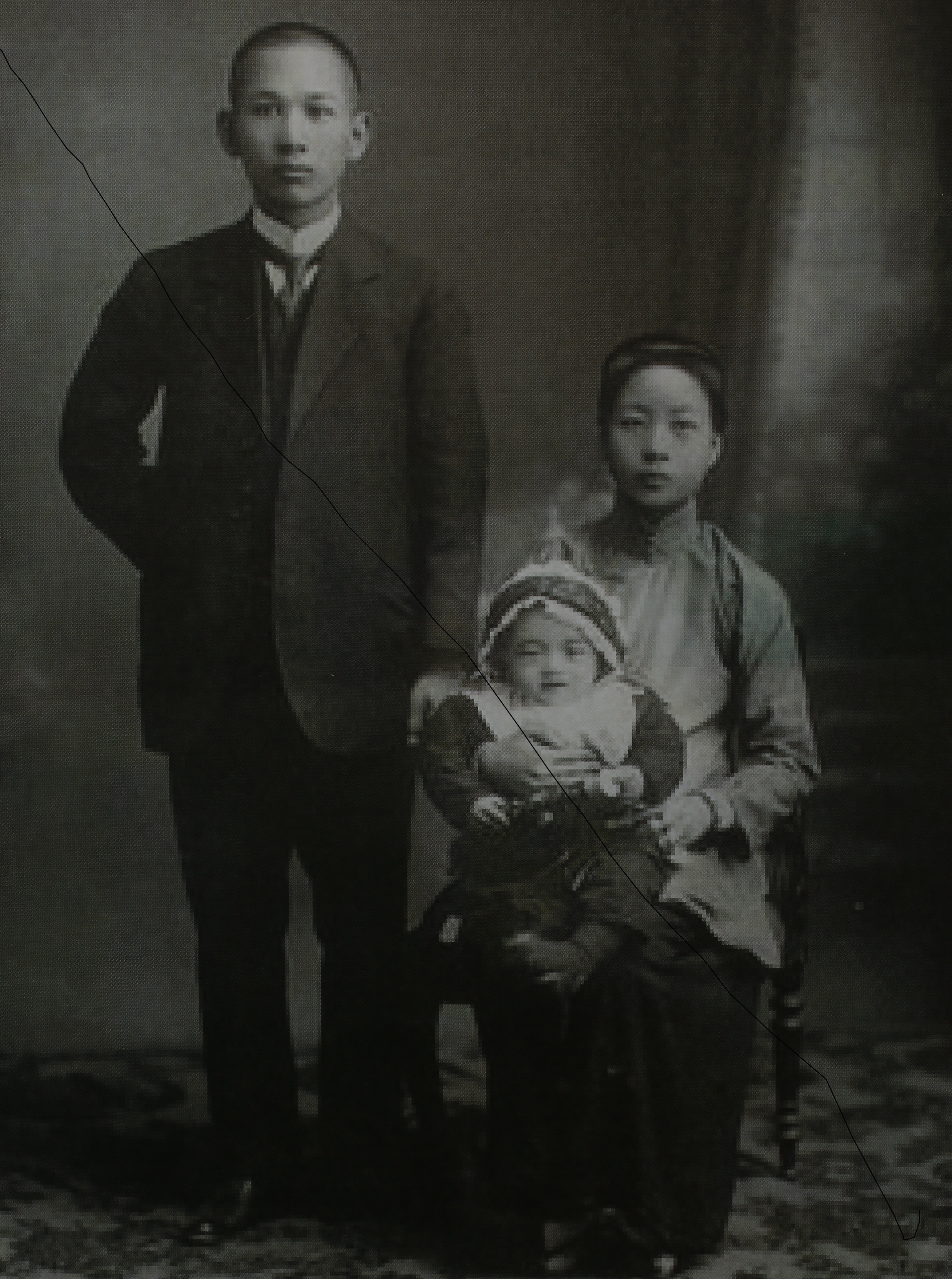 Su Beng as a child and his father and mother. Photo credit: Su Beng
Su Beng as a child and his father and mother. Photo credit: Su Beng
Because of his father’s influence, from a young age Su Beng was aware of the contradictions and conflicts of colonial society. Gradually he came to oppose Japanese colonial rule. On the other hand, although his father was close to Enlightenment thought, his mother loved traditional Chinese learning, poems, and classical Chinese. But his grandmother, who in her everyday life followed folk customs and celebrated rituals, also influenced him. In the recently published The Memoirs of Su Beng, Su Beng emphasized the influence of the local conditions of Shilin (formerly Bachilin) and the festivals of Taiwanese people on him. If you can think of tangyuan eaten in winter solstice and making runbing for year-end dinners, then you can understand why Su Beng and others emphasize the important factors of tradition and modernity.
The Fate of Colonized Peoples: The Twists and Turns of Protest and Self-Awakening
OR MAYBE it was because of being a colonial subject that Su Beng’s spirit of resistance developed through a winding route. In his fourth year of study at Taipei First Boy’s School (at that time, high school included five grades before graduation), Su Beng experienced the hardship of colonial society. In addition, because of the hard-to-dispel frustrations of adolescence (Su Beng was not willing to follow his mother’s wishes and study to be a doctor), he decided to escape home to Tokyo and take cram school classes for the entrance exam to study political science and economics at Waseda University. He hoped through political science and economics, he could understand Taiwan’s difficult and unfavorable situation.
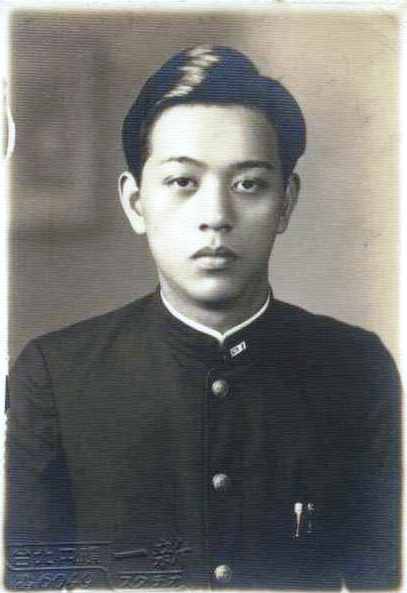 A young Su Beng. Photo credit: WikiCommons
A young Su Beng. Photo credit: WikiCommons
During his time in college, Su Beng encountered further European and American contemporary Enlightenment thought, outside of this, he was also drawn into the study of 20th century capitalism and the tide of socialist thought. Because he participated in a reading group organized by a member of the Chinese Communist Party, he deeply absorbed Marxism, and decided go to China after graduating college. During the Second World War, although in appearances he held a post under the Wang Jingwei regime, in reality he was passing intelligence about the Japanese army to the intelligence services of the Chinese Communist Party between Suzhou and Shanghai, although he was never a member of the Chinese Communist Party.
After the end of the war, still believing in Marxism, Su Beng began to feel somewhat empty. Su Beng knew other Taiwanese people in China who sped home, but he and his girlfriend Hiraga Kyoko decided to head to the liberated areas of the CCP, wanting to look into the utopia of Marxism. But when Su Beng encountered the land reforms in the liberated area, the suffering of the people was a big shock, so he and Hiraga Kyoko quickly fled back to Taiwan. From this experience, then on, Su Beng did not equate socialism and Marxism with the Chinese Communist Party. At the same time, after returning to Taiwan he experienced the 228 Incident. After the crackdown, seeing the wretched state of Taiwanese society, Su Beng developed the notion of writing Taiwanese history and assassinating Chiang Kai-Shek.
Regardless of whether in Su Beng or Mr. Ts’ao Yung-ho’s personal recollections, at this point they already decided on the idea of writing Taiwanese history. However, as Chiang Kai-Shek’s regime is the illness of Taiwanese people’s hearts and minds, between pen and gunbarrel, Su Beng decided that the former would have to come after the latter, and decided to pursue his ideals without looking back.
A Marginal Prophet: The Non-Mainstream Person of the Taiwanese Independence Movement
THE PROCESS of Su Beng’s awakening and life decisions meant giving up two things: first, deciding on the path of revolution meant giving up having a family. Moreover, in the path of personal discovery, deciding to become a Taiwanese person, Su Beng realized that “China” (whether the version of the CCP or KMT) was false. As a result, Su Beng fled to Japan and he and Hiraga Kyoko began a roadside vendor’s stand. Then after starting New Gourmet in Ikebukuro, his self-awakening took place as a series of investigations in the middle of movement that in the end this became led to the development of him and many Taiwanese people’s shared aspiration into the ideals of Taiwanese independence.
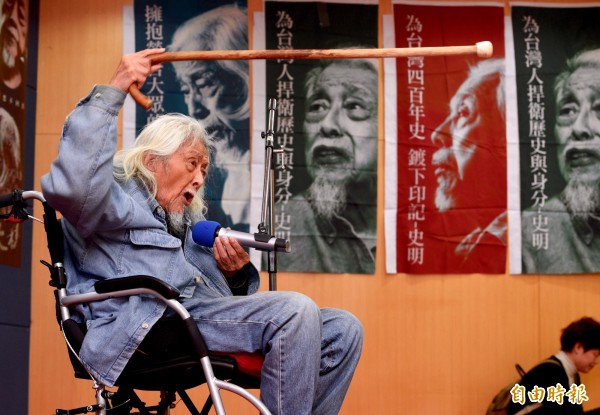 Photo credit: Liberty Times
Photo credit: Liberty Times
Su Beng during the day sold noodles, at night rummaged through books and researched to write Taiwan’s Four Hundred Year History. He and other individuals of the Taiwanese Independence Movement in Japan such as Liāu Bûn-gī and Jian Wenjie, and other people had exchanges, and Su Beng also developed close ties with Ong Iok-tek, Ng Chiau-tong, Koh Se-kai and other members of the Taiwan Youth Association (台灣青年社). But Su Beng was more interested in underground work and did not reject violent means within Taiwan, as he compiled the Taiwan Independence Association’s (獨立台灣會) official journal “Independent Taiwan” (獨立台灣). Su Beng established the Taiwanese Independence Association in 1967 so as to not to be in the mainstream of the Taiwanese independence movement. Additionally, in 1970, with the gradual rise of the Taiwanese independence movement in America, Su Beng gradually shifted from the frontline of the Taiwanese independence movement towards the role of an intellectual pioneer.
Pen and Sword: A Revolutionary Capable of Thought and Action
THE UNITY of knowledge and action is a special characteristic of Su Beng as a participant in the Taiwanese independence movement. We see this from 1962, from when he first used the name “Su Beng” (eventually this became his real name) to publish the first volume of Taiwan’s Four Hundred Year History from the perspective of a Taiwanese person, which he would add to in the course of fifty years, to revise and translate to become a monumental work.
But he is not only a historian, he is moreover a theorist of nationalism, democracy, socialism, and western philosophy. Su Beng in 2016 published The Memoirs of Su Beng, only then would he discuss his views on the CCP discussed in the latter half of Taiwan’s Four Hundred Year History. In The Order of Western Philosophy (2003), Democracy (2007), The National Formation of the Taiwanese People (1992), Taiwanese Nationalist Revolution and Socialist Revolution (1993), he would insert various chapters. Although this arrangement undoubtedly will affect reading, this is for preserving the lifelong Leftist spirit of Su Beng, and letting readers understand his life, that the course of his ideals and thinking can be understood.
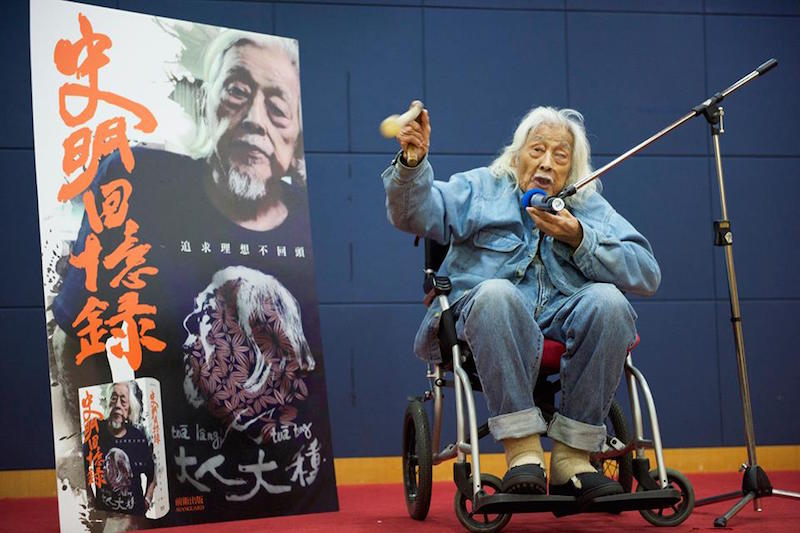 Photo credit: 黃謙賢
Photo credit: 黃謙賢
Moreover, Su Beng never wished to enter the ivory tower of academia. In armed struggle before 1975, there were several times he went through secret channels to travel between Taiwan and Japan; these stories leave one gasping with shock at his persistence and determination. Looking back after after 1975, Su Beng changed the policies of his organization, to place his hopes on a united alliance and multi-generational strategic thinking. In 1980, Su Beng began to frequently go to America to meet with Taiwanese hometown place associations and student groups, using his personal knowledge and methods to enlighten those Taiwanese students who had just arrived in the free world and had their eyes thrown open. These ten years were just like sowing seeds one field at a time, growing Formosan seedlings in foreign countries, that would in the blink of an eye sprout into a forest.
Although His Years Are Now Withered, Continuing to Struggle
SU BENG in 1993 secretly returned to Taiwan. He had moved his stronghold from Kaohsiung to Taipei, in the end, he settled in Xinzhuang. Always adhering to revolution outside of the system, he continued to advocate for Taiwanese independence, for worker’s revolution on the basis of Left independence. Looking back, many times those pushing for revolution within the system would try to win him over, but Su Beng stuck to his own path to enlighten the people nonetheless, using speaker trucks to take on responsibility for Taiwanese people.
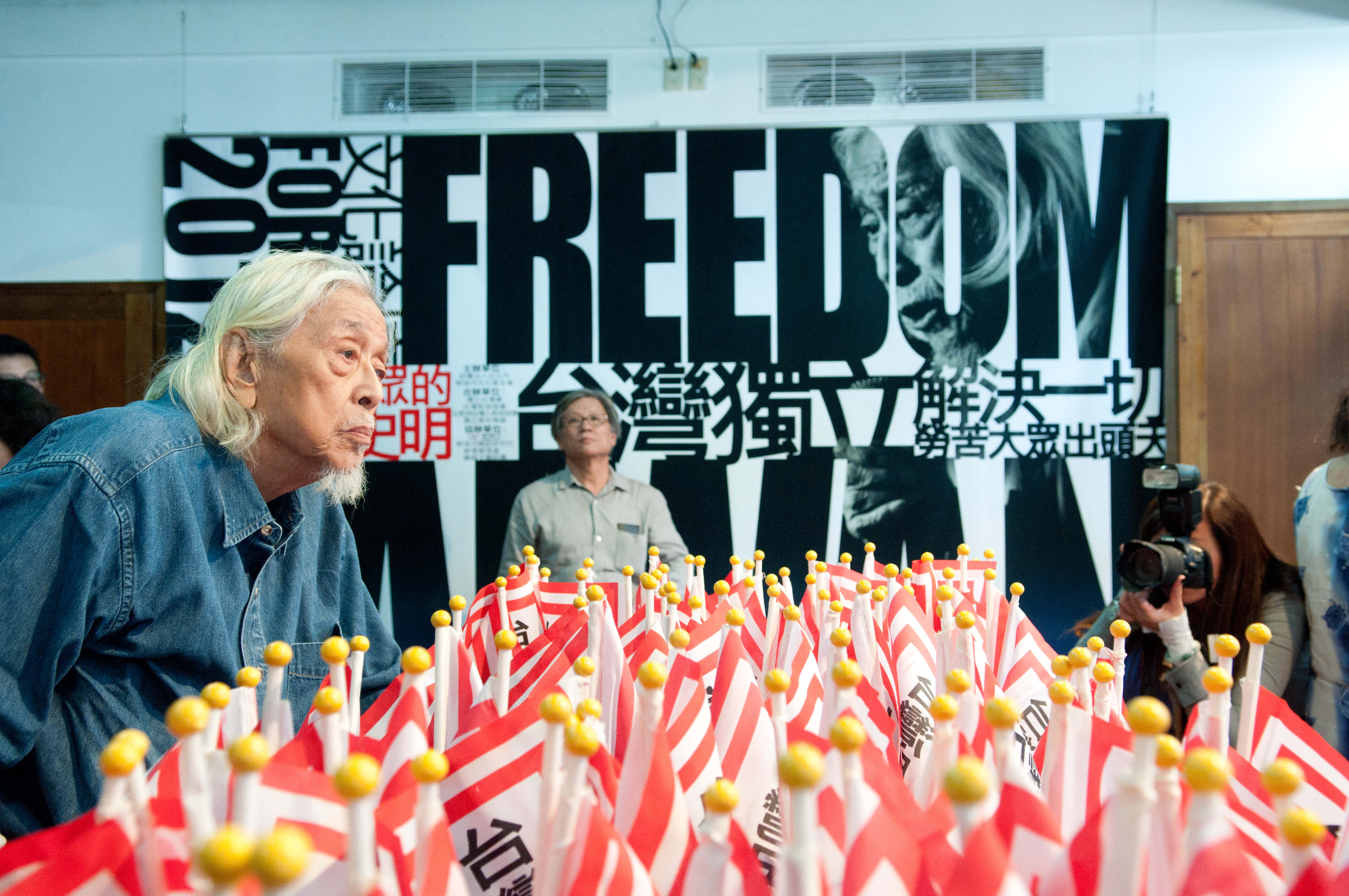 Photo credit: 蔡椏雯
Photo credit: 蔡椏雯
What’s worth paying attention to is, although Su Beng never changed his position on revolution outside the system, he very rarely criticized comrades pushing for revolution from within. For them, revolution inside the system and revolution outside the system were not two parallel lines, but had to complement one another. Only through cooperation could the ideal of Taiwanese independence be achieved. Has this path seen the end today? What we must understand is that for someone who has long gone through ups and downs, even if his years are now withered, he remains committed to his path.


 Su Beng as a child and his father and mother. Photo credit: Su Beng
Su Beng as a child and his father and mother. Photo credit: Su Beng A young Su Beng. Photo credit: WikiCommons
A young Su Beng. Photo credit: WikiCommons Photo credit: Liberty Times
Photo credit: Liberty Times Photo credit: 黃謙賢
Photo credit: 黃謙賢 Photo credit: 蔡椏雯
Photo credit: 蔡椏雯